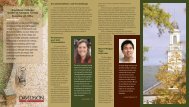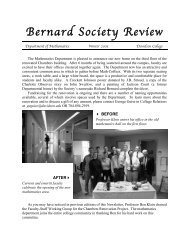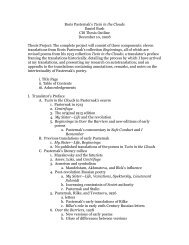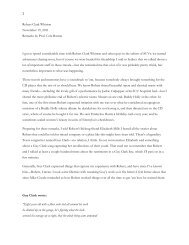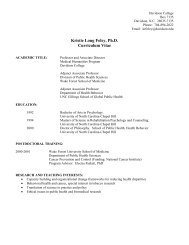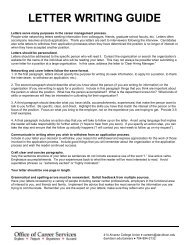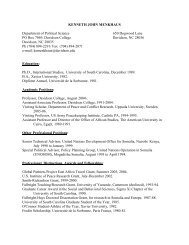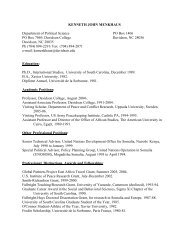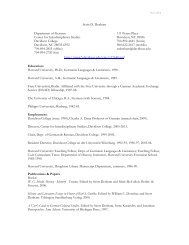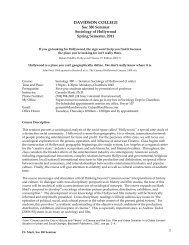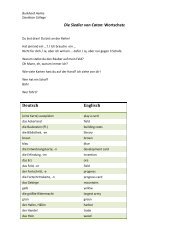Syllabus - Sociological Theory - Davidson College
Syllabus - Sociological Theory - Davidson College
Syllabus - Sociological Theory - Davidson College
Create successful ePaper yourself
Turn your PDF publications into a flip-book with our unique Google optimized e-Paper software.
• Kenneth Morrison. 2006. Marx, Weber, Durkheim: Formations of Modern Social Thought. Second<br />
Edition. Sage Publications.<br />
• Giddens, Anthony. 1973. Capitalism and Modern Social <strong>Theory</strong>: An Analysis of the Writings of Marx,<br />
Durkheim and Max Weber. Cambridge.<br />
• Kenneth Allan. 2007. The Social Lens: An Invitation to Social and <strong>Sociological</strong> <strong>Theory</strong>. Pine Forge<br />
Press.<br />
• Mark A. Schneider. 2006. The <strong>Theory</strong> Primer: A <strong>Sociological</strong> Guide. Rowman and Littlefield.<br />
• Georg Simmel, edited by Donald N. Levine. 1972. Georg Simmel on Individuality and Social<br />
Forms (Heritage of Sociology Series). Chicago.<br />
• Erving Goffman. 1961. Asylums: Essays on the Social Situation of Mental Patients and Other Inmates.<br />
Anchor.<br />
• William Outhwaite. 1995. Habermas: A Critical Introduction (Key Contemporary Thinkers).<br />
Stanford University Press.<br />
• Randall Collins. 2004. Interaction Ritual Chains. Princeton University Press.<br />
Specific Requirements:<br />
Participation, Attendance, Discussion 10%<br />
Student Selected Course Reserve Reading 10%<br />
Analytic Papers Part 1 20%<br />
Analytic Papers Part 2 20%<br />
Theorist Book Report 20%<br />
<strong>Sociological</strong> Theorist Paper 20%<br />
Total Grade = 100%<br />
Participation, Attendance, Discussion are all related to my expectation that students attend class<br />
regularly and participate in class discussions, exercises, and group projects, as required or appropriate.<br />
On Tuesdays, we will usually focus on secondary readings (e.g., Coser, Giddens, Allan, Schnieder, Other<br />
Authors) and a student’s Theorist Book Review. On Thursdays, we will focus on primary readings from<br />
student selected course reserves (see below). I presume students can and will attend all or almost all<br />
classes, but may occasionally have a legitimate reason to miss one class in the semester (extremely sick,<br />
family funeral, etc.). I will take weekly attendance, however I am not interested in adjudicating doctors'<br />
notes and other excuses. Just come to class, and don't miss more than one, if any. An unreasonable<br />
number of absences from class will definitely hurt one's final grade (see on attendance more below).<br />
Entirely faithful class attendance is notable and could make a positive difference in final grades in<br />
borderline cases. For any student, missing 2 weeks-equivalent of class (2 M/W, 4 TTH or 6 MWF)<br />
without excuse is sufficient grounds for failing the course. I do understand student athletes may need to<br />
miss classes, and up to a week-equivalent of class (1 M/W, 2 TTH or 3 MWF) may be excused for athletic<br />
events. Please provide schedules to me at the beginning of the semester. Overall, your active and<br />
prepared participation in class discussion will be worth 10% of the final grade.<br />
Every week, a student will be responsible for a Student Selected Course Reserve Reading. At least 10<br />
days prior to discussing each theorist, students are to select 1-2 chapters (or equivalent) for the class to<br />
read together. One student will sift through the corpus of a theorist’s work to copy and upload a<br />
significant reading excerpt(s); the rest of the class will together read the selected excerpt(s) of each week’s<br />
theorist. Choice of text is up to the discretion of each student, although I am happy to help with<br />
decisions. Selected reading(s) should optimally a) illustrate core theme(s), idea(s), concept(s) of<br />
theoretical work, b) represent core, rather than peripheral, aspects of author’s theoretical achievement(s),<br />
c) be interesting, provocative, and stimulating for the development of sociological perspective.<br />
INSTRUCTIONS FOR PLACING READINGS ON RESERVE: Neatly photocopy pages of the text, along<br />
with title page and identifying bibliographic information. Then see Jean Coates or another librarian at<br />
the front desk of the Little Library and politely inform them you have course reserve readings to upload<br />
Page 4



